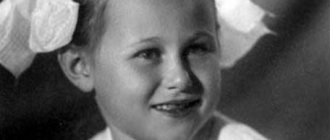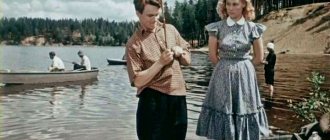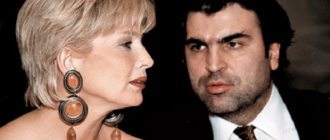Parents
Edward was born in Moscow on September 23, 1936.
His father, Stanislav Adolfovich Radzinsky, born in 1889, was of Polish origin, originally from Odessa. In 1917 he graduated from Novorossiysk University and became a lawyer. He greeted the February Revolution with delight, since he himself was a democratic intellectual, and considered Pavel Miliukov, the leader of the Cadet Party, his idol.
Despite acquiring the profession of a lawyer, he was engaged in literary activities all his life. After the revolution, his articles and reviews under the pseudonym Waiting were published in the Odessa publications Shkval, Odessky Listok, and Life. In the second half of the 1920s, like many other Odessa writers, he left for Moscow. Here he became close friends with the famous Soviet playwrights Yuri Olesha and Eduard Bagritsky. Stanislav Adolfovich wrote scripts for many films, and in 1937 he became a member of the USSR Writers' Union.
Mother, Radzinskaya Sofya Yuryevna (maiden name Zhdanova). Her parents were from the Nekouzsky district of the Yaroslavl region. Then they moved to the Rybinsk region, where Sophia was born. As an adult, Sonya went to Moscow, received the profession of senior investigator and met her husband Stanislav Radzinsky.
Execute, cannot be pardoned
Oleg Radzinsky successfully graduated from Moscow's elite humanities school No. 711, but despite his impeccable certificate, he was not given a medal. And this was understandable, because the well-read boy, brought up with high ideals, did not show himself in any way in the public life of the educational institution and was not a Komsomol member.
It was easy to get into the Faculty of Philology at Moscow State University. All the A's in the certificate only allowed me to write an excellent essay upon admission; other exams were not needed. Oleg did not doubt his abilities at all, so, without even waiting for the exam result, he went on vacation. After successfully graduating from the university, graduate school was planned, but Oleg Radzinsky was no longer able to complete it.
While still a student, Oleg distributed anti-Soviet literature, and then completely joined the dissident movement. In the early 80s there was a “Trust Group”. This is a pacifist organization that seeks to expose the militaristic plans of the two superpowers: the USSR and the USA and to prevent the arms race.
In the Trust Group, Oleg was much younger than other members of the dissident movement, among whom there were undoubtedly many representatives of the intelligentsia: scientists, writers, actors. Looking back, he recalls this period of his life with self-irony, considering his contribution to the movement to be scanty. Is that the rules of the article for mass distribution as a philologist.
Childhood and youth
From an early age, his parents tried to instill in Edward high moral principles that were not influenced by time and the political system. Constant communication with his father, a representative of the Russian intelligentsia, contributed to the fact that the boy grew up precocious.
When the war began, Edward was not even five years old. The family was evacuated to Tashkent, where their neighbor was the poetess Anna Akhmatova. At the end of 1942, the Radzinskys returned to Moscow.
Edward studied well at school and especially loved literature. Like all his boy friends, he loved football and was the goalkeeper of the local team. He was also interested in other sports - boxing, swimming, athletics, cross-country skiing. But most of all he loved to run, a habit he stuck to all his life. He always strived to be the first in everything; from childhood he learned not to stop in the face of difficulties, but to overcome them.
His father’s literary activity had a huge impact on the development of his son’s creative potential. Edward took up writing quite early, and when the guy was sixteen years old, his first work was published.
An excerpt characterizing Radzinsky, Edward Stanislavovich
– How many years have you been eating the world? - Karp shouted at him. - It’s all the same to you! You dig up the little jar, take it away, do you want to destroy our houses or not? - It was said that there should be order, no one should leave the houses, so as not to take out any blue gunpowder - that’s all it is! - shouted another. “There was a line for your son, and you probably regretted your hunger,” the little old man suddenly spoke quickly, attacking Dron, “and you shaved my Vanka.” Oh, we're going to die! - Then we’ll die! “I am not a refuser from the world,” said Dron. - He’s not a refusenik, he’s grown a belly!.. Two long men had their say. As soon as Rostov, accompanied by Ilyin, Lavrushka and Alpatych, approached the crowd, Karp, putting his fingers behind his sash, slightly smiling, came forward. The drone, on the contrary, entered the back rows, and the crowd moved closer together. - Hey! Who is your headman here? - Rostov shouted, quickly approaching the crowd. - The headman then? What do you need?.. – asked Karp. But before he could finish speaking, his hat flew off and his head snapped to the side from a strong blow. - Hats off, traitors! - Rostov’s full-blooded voice shouted. -Where is the headman? – he shouted in a frantic voice. “The headman, the headman is calling... Dron Zakharych, you,” submissive voices were heard here and there, and hats began to be taken off their heads. “We can’t rebel, we keep order,” said Karp, and several voices from behind suddenly spoke up at the same moment: “Like the old people grumbled, there are a lot of you in charge...” “Talk?.. Riot!.. Robbers!” Traitors! - Rostov screamed senselessly, in a voice that was not his own, grabbing Karp by the yurot. - Knit him, knit him! - he shouted, although there was no one to knit him except Lavrushka and Alpatych. Lavrushka, however, ran up to Karp and grabbed his hands from behind. – Will you order our people to call from under the mountain? - he shouted. Alpatych turned to the men, calling two of them by name to mate Karp. The men obediently emerged from the crowd and began to loosen their belts. - Where is the headman? - Rostov shouted. The drone, with a frowning and pale face, emerged from the crowd. -Are you the headman? Knit, Lavrushka! - Rostov shouted, as if this order could not meet with obstacles. And indeed, two more men began to tie Dron, who, as if helping them, took off the kushan and gave it to them. “And you all listen to me,” Rostov turned to the men: “Now march home, and so that I don’t hear your voice.” “Well, we didn’t do any harm.” That means we are just being stupid. They just made nonsense... I told you there was a mess,” voices were heard reproaching each other. “I told you so,” said Alpatych, coming into his own. - This is not good, guys! “Our stupidity, Yakov Alpatych,” answered the voices, and the crowd immediately began to disperse and scatter throughout the village. The two tied men were taken to the manor's courtyard. Two drunk men followed them. - Oh, I’ll look at you! - said one of them, turning to Karp. “Is it possible to talk to gentlemen like that?” What did you think? “Fool,” confirmed the other, “really, a fool!” Two hours later the carts stood in the courtyard of Bogucharov’s house. The men were briskly carrying out and placing the master's things on the carts, and Dron, at the request of Princess Marya, was released from the locker where he had been locked, standing in the courtyard, giving orders to the men. “Don’t put it in such a bad way,” said one of the men, a tall man with a round, smiling face, taking the box from the maid’s hands. - It also costs money. Why do you throw it like that or half a rope - and it will rub. I don't like it that way. And so that everything is fair, according to the law. Just like that, under the matting and covering it with hay, that’s what’s important. Love! “Look for books, books,” said another man, who was taking out Prince Andrei’s library cabinets. - Don't cling! It's heavy, guys, the books are great! - Yes, they wrote, they didn’t walk! – the tall, round-faced man said with a significant wink, pointing to the thick lexicons lying on top. Rostov, not wanting to impose his acquaintance on the princess, did not go to her, but remained in the village, waiting for her to leave. Having waited for Princess Marya's carriages to leave the house, Rostov sat on horseback and accompanied her on horseback to the path occupied by our troops, twelve miles from Bogucharov. In Yankov, at the inn, he said goodbye to her respectfully, allowing himself to kiss her hand for the first time. “Aren’t you ashamed,” he answered Princess Marya, blushing, to the expression of gratitude for her salvation (as she called his action), “every police officer would have done the same.” If only we had to fight with the peasants, we would not have allowed the enemy so far away,” he said, ashamed of something and trying to change the conversation. “I’m only happy that I had the opportunity to meet you.” Farewell, princess, I wish you happiness and consolation and wish to meet you under happier conditions. If you don't want to make me blush, please don't thank me. But the princess, if she did not thank him in more words, thanked him with the whole expression of her face, beaming with gratitude and tenderness. She couldn't believe him, that she had nothing to thank him for. On the contrary, what was certain for her was that if he had not existed, she would probably have died from both the rebels and the French; that, in order to save her, he exposed himself to the most obvious and terrible dangers; and what was even more certain was that he was a man with a high and noble soul, who knew how to understand her situation and grief. His kind and honest eyes with tears appearing on them, while she herself, crying, talked to him about her loss, did not leave her imagination. When she said goodbye to him and was left alone, Princess Marya suddenly felt tears in her eyes, and here, not for the first time, she was presented with a strange question: does she love him? On the way further to Moscow, despite the fact that the princess’s situation was not happy, Dunyasha, who was riding with her in the carriage, more than once noticed that the princess, leaning out of the carriage window, was smiling joyfully and sadly at something. “Well, what if I loved him? - thought Princess Marya. Ashamed as she was to admit to herself that she was the first to love a man who, perhaps, would never love her, she consoled herself with the thought that no one would ever know this and that it would not be her fault if she remained without anyone for the rest of her life. speaking of loving the one she loved for the first and last time. Sometimes she remembered his views, his participation, his words, and it seemed to her that happiness was not impossible. And then Dunyasha noticed that she was smiling and looking out the carriage window. “And he had to come to Bogucharovo, and at that very moment! - thought Princess Marya. “And his sister should have refused Prince Andrei!” “And in all this, Princess Marya saw the will of Providence. The impression made on Rostov by Princess Marya was very pleasant. When he remembered about her, he became cheerful, and when his comrades, having learned about his adventure in Bogucharovo, joked to him that, having gone for hay, he picked up one of the richest brides in Russia, Rostov became angry. He was angry precisely because the thought of marrying the meek Princess Marya, who was pleasant to him and with a huge fortune, came into his head more than once against his will. For himself personally, Nikolai could not wish for a better wife than Princess Marya: marrying her would make the countess - his mother - happy, and would improve his father’s affairs; and even - Nikolai felt it - would have made Princess Marya happy. But Sonya? And this word? And this is why Rostov got angry when they joked about Princess Bolkonskaya. Having taken command of the armies, Kutuzov remembered Prince Andrei and sent him an order to come to the main apartment. Prince Andrei arrived in Tsarevo Zaimishche on the very day and at the very time of the day when Kutuzov made the first review of the troops. Prince Andrei stopped in the village at the priest’s house, where the commander-in-chief’s carriage stood, and sat on a bench at the gate, waiting for His Serene Highness, as everyone now called Kutuzov. On the field outside the village one could hear either the sounds of regimental music or the roar of a huge number of voices shouting “hurray!” to the new commander-in-chief. Right there at the gate, ten steps from Prince Andrei, taking advantage of the prince’s absence and the beautiful weather, stood two orderlies, a courier and a butler. Blackish, overgrown with mustaches and sideburns, the little hussar lieutenant colonel rode up to the gate and, looking at Prince Andrei, asked: is His Serene Highness standing here and will he be there soon? Prince Andrei said that he did not belong to the headquarters of His Serene Highness and was also a visitor. The hussar lieutenant colonel turned to the smart orderly, and the orderly of the commander-in-chief said to him with that special contempt with which the orderlies of commanders-in-chief speak to officers: “What, your Serene Highness?” It must be now. You that? The hussar lieutenant colonel grinned into his mustache in the tone of the orderly, got off his horse, gave it to the messenger and approached Bolkonsky, bowing slightly to him. Bolkonsky stood aside on the bench. The hussar lieutenant colonel sat down next to him. – Are you also waiting for the commander-in-chief? - the hussar lieutenant colonel spoke. – Govog’yat, it’s accessible to everyone, thank God. There’s a problem with sausage makers! Nedag Egmolov joined the Germans. Now, maybe it will be possible to talk in G'ussian. Otherwise they don't know what they were doing. Everyone retreated, everyone retreated. Have you done the hike? - he asked. “I had the pleasure,” answered Prince Andrei, “not only to participate in the retreat, but also to lose in this retreat everything that was dear to me, not to mention the estates and home... of my father, who died of grief.” I am from Smolensk. - Eh?.. Are you Prince Bolkonsky? It would be great to meet you: Lieutenant Colonel Denisov, better known as Vaska,” said Denisov, shaking Prince Andrei’s hand and peering into Bolkonsky’s face with especially kind attention. “Yes, I heard,” he said with sympathy and, after a short silence, continued: “Here comes the Scythian war.” This is all hog'osho, but not for those who take the rap on their own sides. Are you Prince Andgey Bolkonsky? – He shook his head. “It’s very nice, prince, it’s very nice to meet you,” he added again with a sad smile, shaking his hand. Prince Andrei knew Denisov from Natasha's stories about her first groom. This memory, both sweet and painful, now transported him to those painful sensations that he had not thought about for a long time, but which were still in his soul. Recently, so many other and such serious impressions as leaving Smolensk, his arrival in Bald Mountains, the recent death of his father - so many sensations were experienced by him that these memories had not come to him for a long time and, when they did, had no effect on him. him with the same strength. And for Denisov, the series of memories that Bolkonsky’s name evoked was a distant, poetic past, when, after dinner and Natasha’s singing, he, without knowing how, proposed to a fifteen-year-old girl. He smiled at the memories of that time and his love for Natasha and immediately moved on to what was now passionately and exclusively occupying him. This was the campaign plan he came up with while serving in the outposts during the retreat. He presented this plan to Barclay de Tolly and now intended to present it to Kutuzov. The plan was based on the fact that the French line of operations was too extended and that instead of, or at the same time, acting from the front, blocking the way for the French, it was necessary to act on their messages. He began to explain his plan to Prince Andrei. “They can’t hold this entire line.” This is impossible, I answer that they are pg'og'vu; give me five hundred people, I'll destroy them, that's veg! One system is Pag'tizan. Denisov stood up and, making gestures, outlined his plan to Bolkonsky. In the middle of his presentation, the cries of the army, more awkward, more widespread and merging with music and songs, were heard at the place of review. There was stomping and screaming in the village. “He’s coming himself,” shouted a Cossack standing at the gate, “he’s coming!” Bolkonsky and Denisov moved towards the gate, at which stood a group of soldiers (an honor guard), and saw Kutuzov moving along the street, riding a low bay horse. A huge retinue of generals rode behind him. Barclay rode almost alongside; a crowd of officers ran behind them and around them and shouted “Hurray!” The adjutants galloped ahead of him into the courtyard. Kutuzov, impatiently pushing his horse, which was ambling under his weight, and constantly nodding his head, put his hand to the cavalry guard’s bad-looking cap (with a red band and without a visor) that he was wearing. Having approached the honor guard of fine grenadiers, mostly cavaliers, who saluted him, he silently looked at them for a minute with a commanding stubborn gaze and turned to the crowd of generals and officers standing around him. His face suddenly took on a subtle expression; he raised his shoulders with a gesture of bewilderment. - And with such fellows, keep retreating and retreating! - he said. “Well, goodbye, general,” he added and started his horse through the gate past Prince Andrei and Denisov. - Hooray! hooray! hooray! - they shouted from behind him. Since Prince Andrei had not seen him, Kutuzov had grown even fatter, flabby, and swollen with fat. But the familiar white eye, and the wound, and the expression of fatigue in his face and figure were the same. He was dressed in a uniform frock coat (a whip hung on a thin belt over his shoulder) and a white cavalry guard cap. He, heavily blurring and swaying, sat on his cheerful horse. “Whew... whew... whew...” he whistled barely audibly as he drove into the yard. His face expressed the joy of calming a man intending to rest after the mission. He took his left leg out of the stirrup, falling with his whole body and wincing from the effort, he lifted it with difficulty onto the saddle, leaned his elbow on his knee, grunted and went down into the arms of the Cossacks and adjutants who were supporting him. He recovered, looked around with his narrowed eyes and, glancing at Prince Andrei, apparently not recognizing him, walked with his diving gait towards the porch. “Whew... whew... whew,” he whistled and again looked back at Prince Andrei. The impression of Prince Andrei's face only after a few seconds (as often happens with old people) became associated with the memory of his personality. “Oh, hello, prince, hello, darling, let’s go...” he said tiredly, looking around, and heavily entered the porch, creaking under his weight. He unbuttoned and sat down on a bench on the porch. - Well, what about father? “Yesterday I received news of his death,” Prince Andrei said briefly. Kutuzov looked at Prince Andrei with frightened open eyes, then took off his cap and crossed himself: “The kingdom of heaven to him! May God's will be over us all! He sighed heavily, with all his chest, and was silent. “I loved and respected him and I sympathize with you with all my heart.” He hugged Prince Andrei, pressed him to his fat chest and did not let him go for a long time. When he released him, Prince Andrei saw that Kutuzov’s swollen lips were trembling and there were tears in his eyes. He sighed and grabbed the bench with both hands to stand up. “Come on, let’s come to me and talk,” he said; but at this time Denisov, just as little timid in front of his superiors as he was in front of the enemy, despite the fact that the adjutants at the porch stopped him in angry whispers, boldly, knocking his spurs on the steps, entered the porch. Kutuzov, leaving his hands resting on the bench, looked displeased at Denisov. Denisov, having identified himself, announced that he had to inform his lordship of a matter of great importance for the good of the fatherland. Kutuzov began to look at Denisov with a tired look and with an annoyed gesture, taking his hands and folding them on his stomach, he repeated: “For the good of the fatherland? Well, what is it? Speak." Denisov blushed like a girl (it was so strange to see the color on that mustachioed, old and drunken face), and boldly began to outline his plan for cutting the enemy’s operational line between Smolensk and Vyazma. Denisov lived in these parts and knew the area well. His plan seemed undoubtedly good, especially from the power of conviction that was in his words. Kutuzov looked at his feet and occasionally glanced at the courtyard of the neighboring hut, as if he was expecting something unpleasant from there. A general with a briefcase under his arm actually appeared from the hut he was looking at during Denisov’s speech.
Education and students
Having received a certificate of secondary education, Radzinsky continued his studies at the Moscow Historical and Archival Institute. Among his teachers was the famous historian A. A. Zimin.
During his student years, the young man became very interested in the activities and works of the famous Russian linguist, translator and theater figure of the 19th century, Gerasim Lebedev, who was the first Russian Indologist to study Calcutta grammar and Indian culture. His work became the topic of Edward's thesis, which was subsequently translated into several languages and published in the UNESCO Information publication.
After this, Radzinsky met and began to correspond with a scientist from India, Magadev Prasad Saha, who also studied Lebedev’s works. This passion was later reflected in Radzinsky’s work “My Dream...India,” staged in 1958 at the Moscow Theater for Young Spectators. The performance was such a success that Radzinsky, in addition to documentary articles, began to devote more and more time to writing plays.
Edward Radzinsky now
In 2020, Edward Radzinsky celebrated his 80th birthday. Vladimir Putin, Vladimir Medinsky, as well as colleagues in the theater and writing workshop congratulated him on his anniversary. But advanced age does not become an obstacle for a historian in his work. Edward Radzinsky creates a series of research films called “The Gods Thirst”; he appears in public and entertainment programs, including the program “Evening Urgant”.
At the beginning of 2020, Channel One aired a program by Vladimir Pozner, in which the famous hero of the day became an invited guest. In addition, a new documentary film by Radzinsky, “The Kingdom of Women,” was presented, which tells about the reign of Tsarina Elizabeth Petrovna and her predecessors.
Theater
Already the second work written by the playwright Radzinsky brought him fame. In 1964, director Anatoly Efros staged a play based on the play “104 Pages about Love” at the Lenin Komsomol Theater. Following Lenkom, Georgy Tovstonogov (head of the Leningrad Bolshoi Drama Theater) took up the production. Popular directors gave birth to many theater groups in the Soviet Union, and six months later the performance was staged in many large cities.
A sad story about human relationships and love swept through Soviet cities with such resounding success that film director Georgy Natanson in 1968 began filming the feature film “Once More About Love.” The main roles were played by Alexander Lazarev and Tatyana Doronina.
Still from the film “Once More About Love” based on the play by E. Radzinsky
After this, a long and fruitful collaboration began between playwright Edward Radzinsky and the country's leading theater directors - Goncharov, Viktyuk, Fokin. Radzinsky wrote play after play, and not one of them ended up on a dusty shelf; every single one of them was staged. Regardless of the genre, audiences received his work with delight:
- "Theater of the times of Nero and Seneca";
- "Tour Base";
- "Monologue about marriage";
- “I’m standing at the restaurant: it’s too late to get married, it’s too early to die”;
- "Conversations with Socrates";
- “A little bit about a woman”;
- “She is in the absence of love and death”;
- “Our Decameron, confession of the stepson of the century”;
- "Continuation of Don Juan";
- “Seducer Kolobashkin”;
- "An old actress for the role of Dostoevsky's wife."
Performances based on his works were staged not only in the USSR; many plays were translated into other languages and were successfully staged in New York, Paris, and Copenhagen.
RADZINSKY Edward Stanislavovich
Playwright, writer, screenwriter, winner of four national television awards "Tefi"
Born on September 23, 1936 in Moscow. Father - Stanislav Adolfovich Radzinsky (1889–1969), playwright, screenwriter, member of the Union of Writers of the USSR. Mother - Sofya Yulievna Radzinskaya (1908–1991), senior investigator. Son - Radzinsky Oleg Edwardovich (born 1958), businessman. Edward Radzinsky's father, Stanislav Adolfovich, was born in Odessa and was a graduate of the famous royal Richelieu classical gymnasium. In 1917 he graduated from the Faculty of Law of Novorossiysk University, in 1922 he began his literary career, and from 1923 he worked as the head of the Literary Department of the Odessa Film Factory. Stanislav Adolfovich was not just an educated person - he thought in French, English and German. He lived with a smile, which he continued to maintain even in difficult life circumstances, and was a deeply religious man who had a huge spiritual influence on his son. S.A. Radzinsky was a man of the highest culture, showed brilliant hopes, dreamed of running for the Constituent Assembly, but the revolution ruined everything. Lived wisely. “Irony and compassion” was his motto, which Edward tried to follow. Stanislav Adolfovich was friends with S.M. Eisenstein, I.E. Babel, Yu.K. Oleshy. As a child, Edward Radzinsky was fond of sports: he played football, boxing, athletics, was a good runner and always came first. He began writing while still in school, and his first story was published at the age of 16. After graduating from school, Edward entered the Moscow Institute of History and Archives, where he had the good fortune to be a student of the famous historian Alexander Alexandrovich Zimin. While studying in his first year, E. Radzinsky became interested in the work of an unusual person - Gerasim Lebedev, who founded the first Indian permanent theater of the European type in India in the 18th century. Edward wrote a thesis on the activities of Gerasim Lebedev, which was published in the UNESCO Information magazine in many languages. Radzinsky received a letter from Indian professor Magadev Prasad Saha, who also studied Lebedev’s activities, and they subsequently exchanged documents. For Edward, the most important were the romantic events that happened with Lebedev and his attitude towards Love and Art. Radzinsky wrote a play, and since he lived opposite the Theater for Young Spectators, he gave the manuscript there. In 1960, the premiere of the play based on the play by the young playwright Edward Radzinsky, which was called “My Dream... India,” took place. Wide fame came to E. Radzinsky in the 1960s, after Anatoly Efros staged two of his plays: “104 pages about love” and “A movie is being made” at the Lenin Komsomol Theater. The play “104 Pages about Love” was performed in 120 theaters of the Soviet Union, the cult film of the 1960s “Once More About Love” was made based on it, a ballet and opera were staged, and years later a remake of the film was released – “Sky, Girl, Plane”. Edward Radzinsky was not even 30 years old when his plays were successfully performed on the stage of the country. He wrote play after play, and every single one was staged, surrounding the author with an aura of fame, the light of which was able to break through even through the Iron Curtain. Each of Radzinsky’s plays instantly became a hit of the theater season, especially those in which he wrote about love: “About a Woman”, “She is in the Absence of Love and Death”, “Continuation of Don Juan”, “Monologue about Marriage”, “Pleasant Woman with a Flower” and windows to the north." Writing to a man about a woman is like traveling to another planet. His heroine is a Woman who cannot live without Love. In the 1970s, when the “fashion for Radzinsky” had already been established, he also began to be banned “according to the fashion” of those years. But this was also a step towards recognition. In the Soviet Union, the works of E. Radzinsky sometimes had a difficult fate. Three performances based on his plays were banned. The play “Conversations with Socrates” is worthy of being included in the Guinness Book of Records: for six years the Moscow Theater named after Vl. Mayakovsky rehearsed it continuously until he received censorship permission. The performance, staged by A. Goncharov, was a huge success and lasted on stage for 14 years. In the late 1980s - early 1990s, 10 performances based on the playwright’s plays were staged in Moscow, including the most famous historical trilogy - “Lunin, or the Death of Jacques”, “Conversations with Socrates”, “Theater of the Times of Nero and Seneca”. The audience remembered the performances “I am standing at the restaurant: getting married is too late, dying is early”, “Sports scenes of 1981”, “Our Decameron”, “The battlefield after the victory belongs to the marauders”, “The last night of the last king”. It happened that on the same day several performances of the playwright were staged simultaneously - at the Mayakovsky Theater, at the Gorky Moscow Art Theater, at the Theater on Malaya Bronnaya and at the Ermolova Theater. Edward Radzinsky is sure that the main luck is meeting “your director.” His best plays - “104 pages about love”, “A movie is being made”, “The Seducer Kolobashkin”, “The continuation of Don Juan”, “Tour Center” - were staged by the great A. Efros. In the early 1970s, the famous Gabriel Garcia Marquez became acquainted with the work of Radzinsky. This happened at the International Film Festival in Colombia, where Soviet cinema was brought for the first time. It was the film “Once More About Love.” The film received the Grand Prix of the festival. And at the end of the 1980s, the writer saw the play “The Old Actress for the Role of Dostoevsky’s Wife” in one of the Parisian theaters. He really liked the production and remembered it well, because the great Russian culture, and especially the work of Dostoevsky, always worried Marquez, and the “anatomy” of the performance itself seemed very unusual to him. The play “The Old Actress for the Role of Dostoevsky’s Wife,” first staged in France at the Theater of Europe, was performed in 12 countries around the world. The foreign press called it one of Radzinsky's strangest plays, "in which fiction becomes reality and where even after the end of the play we still do not know who its heroes were." Almost all of E. Radzinsky's plays have been staged in many theaters around the world - in America, Canada, France, Germany, Sweden, Denmark, Belgium, Finland, Japan and other countries. Edward Stanislavovich recalls how his plays were performed in New York, at the Cocteau Repetori Theater: “...This theater is located in Greenwich Village. It has existed for more than a dozen years, despite the fact that it mainly stages classics. I am one of the few authors of this theater who did not have a date of death, and with some embarrassment I looked in the program at my year of birth, after which there was a dash and... an empty space, very similar to expectation... This repertory theater is aimed at European culture... This is the theater of ideas...” In the late 1980s, the American magazine “Back Stage” called Edward Radzinsky the most staged Russian writer in the West after Chekhov. Radzinsky worked a lot for cinema as a screenwriter, and in the 1980s he quickly conquered television. It was enough to watch at least one of his programs to become a devoted fan and look forward to the release of new ones. The famous critic Lev Anninsky called Edward Stanislavovich “the undisputed leader among our TV presenters.” As soon as E. Radzinsky began to speak, he instantly bewitched the audience with his unsurpassed oratory. His performances are always improvisation, a theater where everything happens “here and now”, in front of the audience, and Radzinsky’s inner excitement is transmitted to the audience. His programs about history on Channel One TV (ORT) gained extraordinary popularity and were awarded four national television awards “TEFI”. Over time, the author began to need an interlocutor, and he realized: returning to himself means returning to History. He began writing prose about prominent historical figures and became one of the most widely read authors of this genre in the world. His books are published by the world's largest publishers: Doubleday, Simon and Schuster (USA), Bertelsman (Germany), Mondadory (Italy), Norsted (Sweden), WSOY (Finland), NHK (Japan), Hodder and Stoughton (England), JK Lattes (France) and others. The books of Edward Radzinsky tell the world about the tragedy that happened to Russia at the end of the 19th - first half of the 20th century. And his task is to tell the truth about this tragedy. Edward Stanislavovich says: “Unfortunately, the history of Russia so often, under the pen of our historians, becomes “policy facing the past.” But History is like a map for navigation, and if the places where the ship crashed are declared the places of our victories, woe to the country! She will repeat and repeat her mistakes.” Radzinsky writes a lot about the responsibility of a politician: “His main task is to hear the voice of the people, but to obey the voice of History.” E.S. Radzinsky wrote books about Napoleon, Beaumarchais, and the famous French writer Chateaubriand. Documentary books about the execution of Nicholas II, biographies of Stalin and Rasputin became world bestsellers. The editor of the book about Nicholas II was Jacqueline Onassis Kennedy, who worked at the Doubleday publishing house. His last book about Alexander II was published in 2005 and completed the historical cycle “Three Kings”. Reviews of this book have been published in leading American publications: The Wall Street Journal, The NewYork Times book Review, The Washington Times, The Washington Post, The Associated Press and others. US President D. Bush thanked Edward Stanislavovich in a letter for the book “Alexander II,” the presentation of which took place at the Russian Embassy in Washington. These four books made up the author's tetralogy, and the biographies turned out to be truly fascinating novels written by History. Edward Radzinsky is confident that his series will be incomplete without such personalities as Catherine the Great and Lenin. In his books, Edward Stanislavovich creates the effect of the reader’s presence in a particular time, and this is incredibly attractive. When Alliluyeva-Politkovskaya, a relative of Stalin's wife, read a book about Stalin, she said: “I recognized him.” One Western historian wrote about this novel: “As a historian, I did not find much new in it. But he is there. He's alive there. And I pray to God that the terrible spirit generated by this book will quickly leave me.” G.G. Marquez said this about this work: “...I think the main advantage of Edward Radzinsky’s book is that in it Stalin is not a statue, not a giant statue at the entrance to the Volga-Don Canal, but a living person. He managed to understand the Master. Perhaps because he himself lived in this era, lived, like everyone else, in the grip of the “cult of personality” of this semi-literate peasant from Gori, blinded by the wealth of the Kremlin. Radzinsky is a subtle psychologist who has a great understanding of people, both living and dead. He is a man who knows and, most importantly, loves his country. He understands her story. Who, if not him, can solve the “mysteries of Russia” that have already become the talk of the town?!” After reading “The Last Tsar” in Spanish and “Stalin” in English, G.G. Marquez said that these books are the same plays, dramas of History, masterfully constructed performances. The book “The Last Tsar” greatly changed Marquez’s ideas about the personality of Nicholas II. The famous writer says: “Although I have little understanding of Russian history, and even the peculiarities of Russian life itself, I saw these people, I saw Nicholas and his family. I heard them. This is something intimate, a play of the imagination, which at my age, alas, you don’t experience often... When you read about the murder of the royal family and the investigation of this terrible crime, goosebumps run through your skin. Such tragedies cannot be erased from the memory of mankind. And again, Radzinsky builds the narrative as a performance in which characters appear one after another - famous and unknown, leaders and minions, heroes and nonentities. It becomes sad, a feeling of doom appears. Mysteries, mysteries, secrets, omissions, unanswered questions. And the play ends with an ellipsis, or rather, with some kind of sincere, doomed cry from the author’s soul...” In addition to those mentioned, E.S. Radzinsky owns the books: “Games of Writers”, “Napoleon. Life after death”, “Blood and ghosts of the Russian Troubles”, “Princess Tarakanova”, “Death of the Gallant Age”, “In Rus' there is only grief from the mind”. All his works have two main characters. The first is History, majestic and merciless, giving rise to heroes and villains, executioners and their victims. And the second is Love, which at all sharp turns of History helps a person to remain human... The books of Edward Radzinsky are characterized by deep psychologism and a unique author’s style. The ability to present to the reader the most unexpected interpretations of well-known events evokes the admiration of hundreds of thousands of fans of the writer’s work. Radzinsky is interested in the special psychology of people who find themselves at the top among the lightning bolts of History. There is always a play of imagination in his books... But only as much as historical documents allow him. E.S. Radzinsky believes that every journey is an opportunity to look at oneself through the eyes of other people. He loves France and America. For him, a trip abroad is a trip to himself. Since Edward Radzinsky became a playwright, his path has been parallel to that of the Russian theater. Edward Stanislavovich had the opportunity to work with G. Tovstonogov, A. Efros, A. Goncharov, V. Fokin, R. Viktyuk, A. Zhitinkin, K. Ginkas. In May 2007, the author completed and published the play “The Executioner, or Conversations on the Way to the Guillotine,” which the Mossovet Theater began rehearsing. In 2007, the Satire Theater began rehearsing a new contemporary play by the author, “Kino-2 is being made.” Before his “second coming to the theater” at the Moscow Book Fair, Edward Radzinsky presented his new book “My Theater Life” - a kind of summary of his theatrical journey. Edward Radzinsky managed to achieve perfection in different roles. It seems that the truth lies in the phrase he said in one of his interviews: “I never did anything because someone needed it. It was only necessary for me...” E.S. Radzinsky often talks about the fantastic impression of working in the archive, when he seems to come into contact with historical characters who have become legends. The author is interested in the psychology of his heroes - people who changed the world. This is truly something fantastic - it’s as if Edward Stanislavovich finds himself in a different era, sees people of the past, hears their voices. Radzinsky once said: “Imagination is more real than reality,” and this is his truth... The world he writes or talks about exists... The lives of Napoleon, Chateaubriand, Seneca, Alexander II are entire cosmic worlds. He knows the secrets and habits of his heroes, sees the palaces and hovels in which they lived, is present at their birth and can describe their death in detail. This is the profession of Edward Radzinsky - Time Traveler.
Television and literary activity
In the mid-1980s, Radzinsky began to conquer television. Having watched at least one episode of his program “Riddles of History,” viewers eagerly awaited the next one. This historical almanac was shown not only on Russian, but also on Western channels.
Of particular interest were programs about Russian tsars: Ivan the Terrible, Peter I, as well as about the tsar’s favorite Rasputin, the leader of the proletariat Lenin and Stalin. Very soon Radzinsky began to be called the undisputed leader among television presenters.
For his successes on television, Edward received more than one award:
- Saints Cyril and Methodius Award;
- Literary Newspaper Award;
- television award "TEFI" (four times);
- Order of Merit for the Fatherland, IV degree.
Since the 1990s, Edward has also gained fame as a writer, from whose pen historical works came out. He wrote in a simple and accessible language; the books “Stalin” and “The Execution of Nicholas II and His Family” became especially popular among his prose works.
Choice without choice
The authorities fully expected such an answer from the young dissident and he was immediately given a second document to sign, allowing him to leave the country. Oleg Radzinsky left for the USA. He had to get a new profession, since a philologist with a deep knowledge of the Russian language was not quoted in any way. Therefore, Oleg took up the study of jurisprudence at Columbia University.
He was a broker, trader, financial analyst, and banker. For some time he held a very high position in a large media company in Russia. However, on the eve of the elections in 2006, this position had to be left due to American citizenship, which Oleg Radzinsky was indirectly reminded of.
After the sale of the company, Oleg and his family moved to France and happily plunged into writing. He created his first work during his exile, and in 2000 this book was published. This was followed by “Suriname” (2008), “Agafonkin and Time” (2014) and, after 2020, “Chance Encounters”.
Oleg Edwardovich calls his friend Boris Akunin the godfather of this autobiographical work. Many readers of Oleg Radzinsky’s work highly appreciated the book “Chance Meetings” and noted that it was read in one breath. The author's style is light and full of self-irony.
Unlike his parents, Oleg has a large, large family with four children. The only thing a talented writer regrets is wasted time. From the height of his years, he believes that it was possible to serve a shorter term in exile. There are no regrets about the fact that this story was in his biography. Radzinsky gained invaluable experience and realized how stress-resistant and resilient he is.
First wife and son
Radzinsky was married three times, and each time fate brought him together with beautiful, famous women.
His first wife was actress and screenwriter Alla Geraskina. Her mother is the wonderful Soviet writer Liya Geraskina, based on whose work the feature film “Certificate of Maturity” was made, and based on the book “In the Land of Unlearned Lessons” the cartoons “Execution cannot be pardoned” and “One and a half navvies”.
After graduating from the Pedagogical Institute in Leningrad, Alla then studied at the Shchukin Theater School. But, having received the acting profession, she devoted most of her life to literary activity. She translated poetry and novels from French, headed the literary department at the Theater of Miniatures, and wrote the scripts for the popular Zucchini of 13 Chairs in the Soviet Union.
In July 1958, Edward and Alla had a son, Oleg. At the age of eleven, the boy suffered a fracture of the spine and spent two years in a cast. After school, he studied at Moscow State University at the Faculty of Philology, then also completed graduate school.
In 1982, Oleg was arrested for reading anti-Soviet literature (an article for anti-Soviet propaganda and agitation). He spent some time in Lefortovo prison, then was sent to the Tomsk region to a maximum security camp. A total sentence of six years was assigned, but in 1987, during the period of perestroika, he was released and expelled from the country.
Oleg Radzinsky left for the USA, where he graduated from Columbia University, receiving a master's degree in international finance. After studying, he worked in America as an investment banker. In 2002, Oleg bought the Russian Rambler, 4 years later he sold it to businessman Potanin and earned one and a half billion dollars from the deal.
After that, he settled with his family in Europe (he has real estate in the UK and France) and began literary activities. His collections of short stories “Ivan’s Freedom” and “The Visit” and the fantasy novel “Agafonkin and Time” have been published. The most popular novel was Suriname, about the life of the author himself, sex, the search for God, voodoo witchcraft and much more.
Edward's first wife also left for the United States in 1988 following her son; she bears her married name Radzinskaya and is engaged in writing books. The most famous is “Not Reflected in Mirrors,” where Alla shares with readers memories of her friends from the acting, directing and writing community.
Personal life
In search of happiness in his personal life, the famous playwright was married three times, and only the third marriage turned out to be the most durable and stable. Radzinsky's first wife was the young artist Alla Geraskina, the daughter of the famous children's writer Liya Geraskina. Alla not only played on stage, but also wrote. She became one of the writers of “Zucchini “13 Chairs” and headed the literary department of the Moscow Theater of Miniatures. Later, while emigrating to the USA, Alla began writing memoirs about Soviet actors, as well as about her life in the USSR and America.
Edward Radzinsky and his son Oleg
Soon after the wedding, a son was born into the Radzinsky family, who was named Oleg. He followed in his parents' footsteps and graduated from the Faculty of Philology of Moscow State University. In his youth, Oleg became interested in forbidden literature, for which the authorities sent him to a Siberian camp for repeat offenders. Six years later, with the beginning of Perestroika, Oleg was released from captivity, and he immediately left for the United States, where he soon received citizenship. There, Radzinsky’s son, after graduating from a financial university, worked for several years as a manager of a bank, and after some time, having accumulated the necessary amount, he moved to the coast of France, where he began literary work.
The wife of Edward Radzinsky in her youth was the star of the film “Look for a Woman” (right)
For the second time, Edward Radzinsky married the famous Soviet actress Tatyana Doronina. Their union lasted only six years, after which the couple separated, but remained friends.
The writer’s third wife was former film actress Elena (Ukrashchenok) Denisova, who played the role of a secretary in Alla Surikova’s famous detective story “Look for a Woman.” She is 24 years younger than Edward Stanislavovich, but this does not prevent them from living in harmony. Family photos show how tenderly Edward and Elena treat each other. For Elena Denisova, this is already the second marriage; from the first she has a son, Timofey. She has not acted in films for a long time, but is involved in charity work.
Other marriages
For the second time, Radzinsky married one of the most talented and beautiful actresses of Soviet cinema, Tatyana Doronina. She had previously been married to actor Oleg Basilashvili.
When Doronina began her relationship with Radzinsky, she was married to theater critic Anatoly Yufit. Based on Edward’s play, the BDT theater was just staging the play “104 Pages about Love,” where Tatyana played the main role. Radzinsky attended the rehearsals, where he met Doronina. He later said that it was impossible not to fall in love with her, when she played on stage and her gorgeous hair developed against the backdrop of a black curtain, it was impossible to take your eyes off. Tatyana also showed reciprocal feelings for Radzinsky, their romance developed very rapidly.
As soon as Doronina had a serious disagreement with her husband (he did not come to the station to meet her when the actress returned from tour), Edward took advantage of the moment and proposed to her. Tatyana reciprocated, left the BDT for the Moscow Art Theater and in 1966 moved from Leningrad to Moscow to her new husband.
She became for him not only his wife, but also his muse. The playwright wrote his plays specifically for her, and Tatyana then played the main roles in them. The marriage lasted two years.
The third time Edward married Soviet film and theater actress Elena Denisova-Ukraschenok. She is known for her role as secretary Virginia Renoir in the film Look for a Woman. But at the peak of her popularity, Lena left cinema, believed in God and completely changed her lifestyle. Now she, together with churches, is engaged in rehabilitation programs to save people addicted to alcohol and drug addiction. He also works on the radio, where he reads poems on Bible topics.
Lena is 24 years younger than Radzinsky, however, this writer’s marriage turned out to be the most successful; the spouses support each other in difficult times.
Research on the history of Russia[ | ]
In the 1990s, Radzinsky began to write popular science works about tragic periods of Russian and world history, about famous historical figures. He also made television programs from the “Mysteries of History” series, which he calls educational. (In his own words, he began writing historical books in 1976, working on the trilogy “The Last Tsar (Nicholas II), the First Bolshevik Tsar (Stalin) and the Sinful Peasant (Rasputin)”[24].)
Edward Radzinsky's books about Nicholas II, Rasputin, Alexander II and Stalin were published by the world's largest publishing houses and were translated into English, French, German, Italian, Spanish, Portuguese, Greek, Danish, Polish, Finnish, Swedish, Hebrew and other languages. [25]
After reading the Spanish translation of Edward Radzinsky's books about Nicholas II and Joseph Stalin, Gabriel García Márquez wrote[26][ unauthorized source?
]: “Radzinsky is a subtle psychologist who has a great understanding of people, both living and dead. He is a man who knows and, most importantly, loves his country. He understands her story. Who else if not him to solve the “mysteries of Russia” that have already become the talk of the town?!” The author himself connects the reason for the worldwide success of the book about Nicholas II with the fact that this book is not about murder, but about forgiveness, which Radzinsky spoke about more than once in his interviews.
The play “The Last Night of the Last Tsar” is based on the research that Edward Radzinsky conducted over two decades in preparing his book “The Life and Death of Nicholas II.” In 1989-1990, Radzinsky, for the first time in the USSR, published Yurovsky’s note about the execution of the royal family, as well as the testimony of some participants in the execution and a telegram to Lenin from Yekaterinburg about the impending destruction of the royal family[27]. Having combined the testimonies of the participants in the execution of the royal family, Radzinsky, without actually inserting a word, forced these participants to tell about the regicide, second by second. (See, for example, E. Radzinsky. The Last Tsar. M. 2015, Publishing House Ast, Part 3 “Ipatiev Night”) Director Valery Fokin staged the play in the 1990s. The roles in the play were performed by Mikhail Ulyanov, Evgeny Mironov, Alexander Zbruev, Irina Kupchenko.
Time magazine called The Last Night "an unforgettable book that combines the power of a playwright with the skill of a historian." The New York Times Book Review considers it "the definitive book on the final days of the Romanovs." People wrote about the book: “Radzinsky wins by giving us the opportunity to hear the voices of the main characters and the entire Russian society through diaries (including those of Nicholas II and Alexandra Fedorovna), memoirs, letters in which the “twilight of empire” and “red dawn” are clearly visible “”[ source not specified 582 days
].
In his memoirs, Andrei Sakharov wrote [ the significance of the fact?
] about one of E. Radzinsky’s plays: “On Sunday, Lyusya and I accidentally turned on the TV during the day... They showed Radzinsky’s play “Lunin, or the Death of Jacques” - about the Decembrist Lunin. We were struck by the coincidence of the main lines in the play and in the fate and tragedy of Anatoly Marchenko. Lunin in the cell before his death - he knows that the killers will come soon - recalls his whole life, comparing it with the life of another rebel from a book he once read. He remembers how Constantine (the king’s brother) offered him to run away to avoid arrest, but he did not take advantage of the offer, and thinks in the words from the book: “The master thinks that the slave always runs away” (if he has such an opportunity). And further: “But there is always a person in the Empire who says “No!” This is Lunin! And this is Marchenko!”[28].
Criticism[ | ]
- Doctor of Historical Sciences, Professor E. B. Zabolotny and Doctor of Historical Sciences, Professor of the Department of Theory and History of International Relations of UrFU, Director of the Center for the Study of Modern Radicalism and Extremism of UrFU V. D. Kamynin[29]:
If the historiographer tries to realize the wish of A. G. Emanov to turn to the “toolkit” of oral history, interviewing contemporaries, direct participants and witnesses of the historiographic process and consider all this as historiographic sources, then his works will not belong to the scientific genre, but to such the recently widespread genre of folk history, in which G. V. Nosovsky, A. T. Fomenko, S. Valyansky, D. Kalyuzhny, V. Shambarov, E. Radzinsky and many other authors write about our history.
- Analyzing Radzinsky’s book “Lord... save and pacify Russia. Nicholas II: Life and Death” Doctor of Historical Sciences L. A. Lykova comes to the conclusion that the author presents new archival sources, but without mentioning where the documents are located and how they became available to the author, while Radzinsky “interprets” the content of the document text in his own way . So, he changed the meaning of the telegram sent to Zinoviev on July 16, replacing the words about “arranged trial” with “arranged execution.” Thus, “the author’s incorrect handling of archival sources requires a critical source study approach”[30].
Interests and hobbies
Radzinsky was not allowed to leave the country for a long time, and when he was allowed to leave, he was immediately showered with invitations from representatives of different states to stay with them for permanent residence. In one Scandinavian country he was offered a position at a university. But Edward himself never even thought about emigrating. It’s so hard, especially for writers, because the ocean of their native language is lost. Although every time Radzinsky arrives in another country and walks down the plane, he immediately begins to live where he arrived.
For example, he especially loves Paris. I used to spend six months in this city. Edward doesn't like staying in big Parisian hotels. There is one small cozy hotel in the Latin Quarter, where he comes as if to his own home. The staff knows him well, Radzinsky has his own room there, and if it is occupied when Edward arrives, the hotel management even moves people to another room under the pretext of repairs.
The writer works wonderfully in this hotel, and in the mornings he goes jogging in the Luxembourg Gardens, where, as it seems to him, the shadows of Modigliani, Beaumarchais, Akhmatova, Hugo and Desmoulins still roam.
In winter, at his dacha in Krasnovidovo, Radzinsky skis 10-15 kilometers every day. And in the summer he likes to wander alone through the forest and fields.
Bibliography
- 104 pages about love. M.: Art, 1965. - 8,500 copies.
- 104 pages about love. A movie is being made. - M.: 1974.
- Theater: Collection of plays. M.: Art, 1986; — 25,000 copies.
- The Last of the House of Romanov: Stories in Dialogues. M.: JV "All Moscow", 1989. - 100,000 copies.
- The last one from the House of Romanov. - M., Moscow worker, 1989. - 50,000 copies.
- Our Decameron. M.: Moscow worker, 1990. - 50,000 copies.
- Our Decameron. M.: JV “Book Printshop”, 1990. - 160,000 copies.
- Rulers of thoughts. - M.: VAGRIUS, 1993. - 50,000 copies.
- Mysteries of history: Love in the Gallant Age. M.: VAGRIUS, 1995. - 20,000 copies; 1997.- 15,000 copies.
- “...And there was blood.” M.: VAGRIUS, 1996. - 20,000 copies.
- “Lord, save and pacify Russia...” - M., VAGRIUS, 1993—150,000 copies; 1995 - 15,000 copies; 1996. - 20,000 copies.
- Mysteries of love. M.: VAGRIUS, 1996, 2003;
- Stalin. M.: VAGRIUS, 1997, 2000;
- Nicholas II: life and death. M.: VAGRIUS, 1997, 2000. - 11,000 copies, 2003;
- Collected Works in 8 volumes. M.: VAGRIUS, 1998-2001;
- Death of the Gallant Age. M.: VAGRIUS, 1998;
- Blood and ghosts of the Russian Troubles. M.: VAGRIUS, 1999. - 15,000 copies.
- Princess Tarakanova. M.: VAGRIUS, 1999, 2003;
- Tormentor and shadow. M.: VAGRIUS, 1998;
- Prophets and madmen. M.: VAGRIUS, 1999;
- Parade of the Gods. M.: VAGRIUS, 1999;
- Once again about love. M.: VAGRIUS, 1999 - 11,000 copies; M.: Arguments and Facts, Express Service, Zebra-E, 2006;
- Rasputin. Life and death. M.: VAGRIUS, 2000, 2003;
- Writers' games. M.: VAGRIUS, 2001;
- Napoleon: life after death. M.: VAGRIUS, 2002; Zebra-E, 2006;
- Mysteries of history. M.: VAGRIUS, 2003, AST, 2006;
- Mysteries of life and death. M.: VAGRIUS, 2003, 2004;
- Fatal minutes of history. Drama from the time of the French Revolution in three acts. M.: VAGRIUS, 2003;
- The beginning of a theatrical novel. M.: VAGRIUS, 2004; Blood and ghosts of the Russian Troubles. M.: VAGRIUS, 2005;
- The last Tsar Nicholas II. Life and death. M.: EKSMO, 2005;
- Fatal minutes of history. M.: Arguments and Facts, Express Service, Zebra-E, 2005;
- Mysteries of love. M.: Arguments and Facts, Express Service, Zebra-E, 2006;
- The mystery of Beaumarchais. M.: Arguments and Facts, Ex-Press Service, Zebra-E, 2006;
- The mystery of Princess Tarakanova. M.: Arguments and Facts, Express Service, Zebra-E, 2006;
- Ivan IV. Grozny. M.: Arguments and Facts, Express Service, Zebra-E, Harvest, 2006;
- Ipatiev night. M.: Zebra-E, 2006, AST, 2007;
- Confession of a son of our century. M.: Arguments and Facts, Express Service, Zebra-E, 2006;
- Mozart and Casanova. M.: Arguments and Facts, Express Service, 2006;
- In Rus' there is only grief from the mind. M.: Arguments and Facts, Express Service, Zebra-E, 2006;
- Socrates. M.: Zebra-E, 2007;
- Three deaths. Zebra-E, 2007;
- Nicholas II. M., AST, 2007;
- Stalin. M., AST, 2007;
- Executioner. Zebra-E, 2007;
- Alexander II: life and death. M., AST, 2006. - 38,000 copies; 2007 - 10,000 copies; 2011 - 4,000 copies.
- Alexander II. Last day. M., AST, 2007
- Stalin: life and death. M., AST, 2009. (ISBN 978-5-17-047161-4).
- Iron Mask and Count Saint-Germain. M., EKSMO, 2010.
- Mysteries of history. M., Astrel, K.: TOV TsNML, 2011.
- Nicholas II. M., Astrel, K.: TOV TsNML, 2011.
- Apocalypse from Koba. Joseph Stalin. Start. M., Astrel, 2012. (ISBN 978-5-271-42442-7).
- Apocalypse from Koba. Joseph Stalin. Death of gods. M., Astrel, 2012. (ISBN 978-5-271-43920-9).
- Apocalypse from Koba. Joseph Stalin. The last riddle. M., Astrel, 2012. (ISBN 978-5-271-45660-2, 978-5-271-44984-0)
- Prince. Notes from an informer. M., AST, 2013.
- Does love exist, the firefighters ask. — M., AST, 2015










